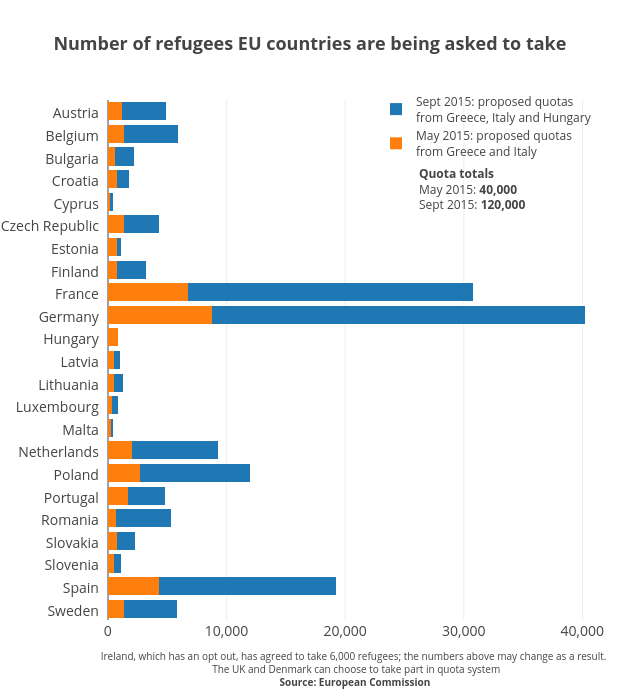Jean-Claude Juncker took to the podium in the European Parliament debating chamber today in his first State of the Union address – the annual speech delivered by the European Commission president to MEPs setting out the Commission's priorities and agenda. Though the Greek crisis, Ukraine and the renegotiation of Britain's relationship with the European Union featured, the migration crisis dominated the address, as Juncker called on EU member states and institutions to take decisive and bold action to respond to the migration crisis unfolding across the European Union.
In terms of detail, much of the speech had been anticipated. The Commission is proposing that an extra 120,000 refugees are relocated across the European Union in addition to the 40,000 figure announced in May. In a departure from the May proposal, Hungary is now being included in the proposal along with Italy and Greece – the Commission is proposing that 120,000 asylum seekers arriving in those three countries are redistributed across the bloc – 54,000 from Hungary, 50,400 from Greece and 15,600 from Italy. Member states will receive €6,000 per relocated person, while Italy Greece and Hungary will receive €500 for each person relocated to cover transport costs.
A key point of contention will be the “distribution key”, the formula by which the European Commission will calculate the numbers to be distributed to each country. Currently the Commission is proposing the same formula it used in May – a calculation based on GDP, population size, unemployment rate and the number of asylum applications already processed.
In practice only 22 of the 28 EU countries will be assigned a quota – Italy, Greece and Hungary are exempt from the proposal, while Britain, Denmark and Ireland are automatically excluded from the proposed legislation because they have an opt-out for "justice and home affairs" matters.
Ireland’s unique position which is seeing it opt-in to the proposal means that Ireland’s percentage will be calculated in parallel to the EU system, though using the same distribution key.
A decision is likely to be made by the Cabinet on the number of refugees it is willing to accept – broadly based on the EU calculation — by the end of the week, with Minister for Justice Frances Fitzgerald expected to present a figure at next Monday's key Justice and Home Affairs meeting in Brussels.
In reality, however, changes are likely to be made to the distribution key over the coming days as officials from member states thrash out details of the plan ahead of Monday.
Within the EU system, the European Commission only proposes legislation which is very often changed and reworked by member states before a final decision is made.
Crucially however, the EU is likely to secure the "qualified majority" – a weighted system of voting – to pass the legislation, following the decision of big countries like Spain and France to back the plan. But the dissent of a number of smaller central and eastern European countries is still significant – as always, the EU will want to secure as much consensus as possible in arriving at a final migration relocation plan, even if that means making concessions to member states with the most concerns. In addition, countries who refuse to participate can be fined up to 0.002 per cent of GDP for non-participation.
While the numbers announced by Jean-Claude Juncker may appear pitifully small, the relocation plan sets a precedent in terms of EU immigration law by establishing the system of mandatory quotas for the first time.
In addition to the 120,000 relocation plan announced today, Jean-Claude Juncker signalled he would move to introduce a more permanent scheme, a proposal that will be difficult to sell to some member states. Today’s announcement also signalled efforts by the European Commission to placate some member states by announcing a tightening of returns policy, and a commitment to strengthen the resources of Frontex, the EU’s border agency.
Juncker also highlighted the need to tackle the root causes of migration, calling for a “stronger Europe” when it comes to foreign policy, perhaps a sign that the bloc may be willing to take a more decisive lead in the area of foreign affairs. How the EU progresses its proposals to target and destroy smugglers’ vessels in the Mediterranean – a legally complex area – will be a key development in the coming months.
:quality(70)/s3.amazonaws.com/arc-authors/irishtimes/cb1219c1-cfa7-44eb-a8f7-aae300bbb987.png)
